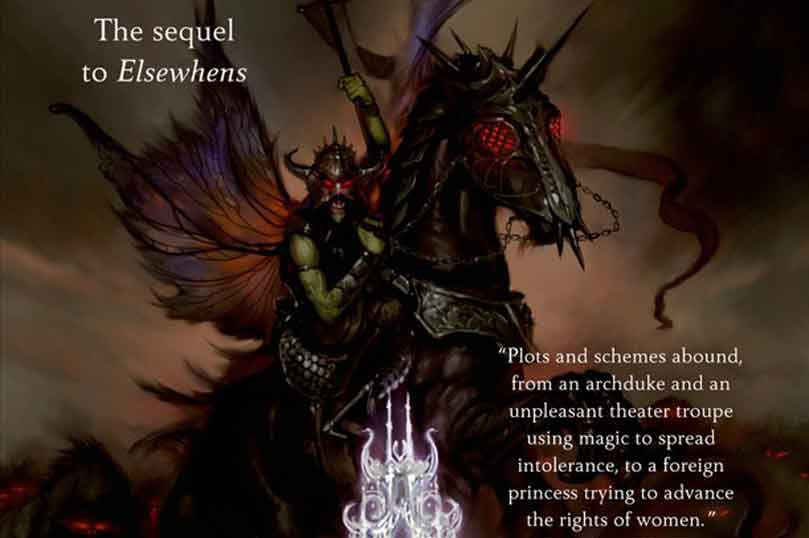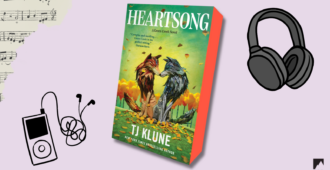Written by Melanie Rawn
Given that the subject of my novels (the Glass Thorns series) is a theater troup who use their magical abilities to enhance their performances, I am often asked the question: “How would your own favorite play work with the magic system you created for your Glass Thorns series?”
Answer: Well, here’s the thing. My favorites are pretty much anything by Shakespeare and Euripedes, Oscar Wilde and George Bernard Shaw, Lion in Winter, Long Day’s Journey into Night, and so on, none of which would benefit at all by the inclusion of the kind of magic that shows up in Glass Thorns. Those playwrights didn’t have any of the flash-dazzle I’ve given my theater troupe; they worked with what they had. Words.
Modern films of Shakespeare’s plays take great delight in showing massive battles (Agincourt, Bosworth Field) that the limitations of Elizabethan theater made impossible, but is it really necessary to see all the blood and gore and guts and horses and swords and armor and banners? One imagines that Shakespeare would have had huge fun with all that, but that fact that he didn’t have the option doesn’t seem to have bothered him much. To me, it’s rather like colorizing B&W movies: sure, it’d be interesting to see Bogie and Bergman in color, but would it really make Casablanca a better film?
Cole Porter, in his last musical for the stage, Silk Stockings, pokes fun at the technological advances of the ’50s, assuring us that nobody would come to see Ava Gardner as Lady Godiva bare-naked on a horse unless she was filmed in:
- Glorious Technicolor,
- Breathtaking Cinemascope or
- Cinerama, Vista Vision, Superscope, or Todd-A-O
- And Stereophonic sound!
If you’ve got toys, you play with them. You write with your toys in mind. This has, in our era of CGI, led to some really spectacular special effects in movies that are, shall we say, a trifle challenged when it comes to plot. Special effects can be delightful, but if you don’t have them to play with, you have to write words that engage the audience as completely as glorious explosions and breath-taking monsters and, heaven help us, sharknados.
(And stereophonic sound.)
Which is not to say such movies aren’t great fun. I’m a total pushover for space operas and let’s-blow-up-Los-Angeles movies, volcanoes and dinosaurs on the rampage. Toys are fun.
The plays my guys perform are actually quite short by our standards—less like a five-hour Hamlet, more like an hour-long Tommy. Their magical toys are sounds, sights, tastes, sensations, scents, and emotions, the intensity of which would become a serious strain on performers and audiences alike after an hour or so.
But what if you don’t have any toys? That’s something that I have my theater group think about, and it bothers them. What if they did a play without the sound effects or the physical sensations or the scenery or the emotions that are conjured by them with magic? They find the idea both intriguing and nerve-shredding. What they’ll eventually work around to is that it’s the words that matter in the end—which is scarcely a startling conclusion to find in a book by somebody who uses words.
When you get right down to the nitty-gritty, as they used to say in my long-ago childhood, as writers we can’t offer you Glorious Technicolor, Breath-taking Cinemascope, and so on and so forth. What we offer you in our books is writing. We use words to tell stories and delineate characters and posit ideas, and the words are all we have. The only thing we can do is write them, and hope that you enjoy them.
Even without Stereophonic sound.
…………………………
From the Tor/Forge April 21st newsletter. Sign up to receive our newsletter via email.
…………………………
More from the April 21st Tor/Forge newsletter:
- Afterparty and the Desktop Drug Revolution by Daryl Gregory
- Oxted: Building Families Since 2017 by William Campbell Powell
- Women of Genre Sweepstakes








An unexpected gem of an essay, Ms. Rawn. I also am a Shakespeare fan, and a musician who plays old old music, and I’ve thought about this kind of thing a lot. I don’t think of it as “not having toys,” but I do think that the act of creation is a conversation between the artist’s vision and the physical reality of what is possible. The boundaries of possibility aren’t barriers, they are collaborators. Thank you.
Excellent essay. Just one caveat — writers work with words. Unfortunately, too many don’t acquaint themselves well with the words or with the rules for using them before publishing a book. Not all writers paint the picture with their words as well as you do.
The man put a BEAR onstage. He would have LOVED for your troupe to play with his stories.
No, I don’t need MORE when it comes to the battles. But Midsummer? Pericles? Mac? The Tempest!
Plus Will did have more than words. He had actors. They WERE his toys.
Having been binging on plays (Shakespeare, Wilder, Shaw, Goethe, & Marlowe) and essays on theatre history & practice (THE SEVEN AGES OF THEATRE by Richard Southern, for ex., with whom you share some topics of theatrical discussion), the appearance of your essay in my in-box (via Tor) was happily met. And it added a little gender balance; by typing my list of authors I realize how shockingly devoid of women they are, though there are some great ones in the plays themselves. Thank you for the wonderful, timely essay . . . and thanks to Tor for the introduction to you (my next stop: the book store).